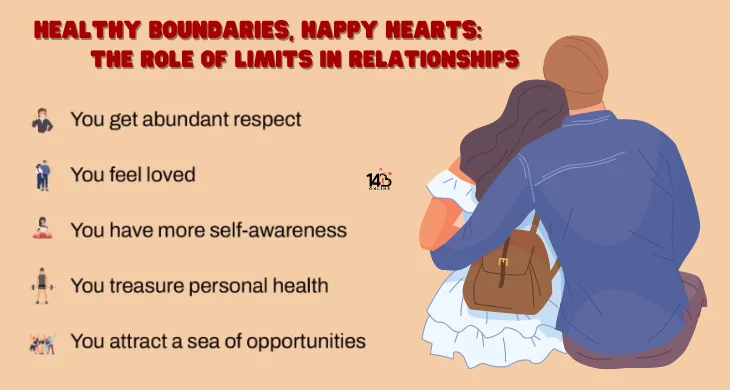Healthy Boundaries, Happy Hearts: The Role of Limits in Relationships explores how setting and respecting boundaries fosters healthier connections and emotional well-being in various relationships.
Respect and Self-Worth
Creating boundaries demonstrates self-respect and acknowledgment of personal needs. This act effectively conveys one’s inherent self-worth and imparts valuable lessons on treating them considerately. Boundaries essentially serve as a guide for others, teaching them how to engage respectfully.
Clear Communication
Maintaining clear boundaries hinges on transparent communication. Open and honest expression of personal limits plays a pivotal role in averting misconceptions, fostering a heightened comprehension of mutual needs, and setting realistic expectations. By articulating boundaries, individuals cultivate an environment where interactions are guided by mutual understanding and respect.
Autonomy and Identity
Healthy boundaries enable individuals to uphold their autonomy and preserve their unique identities within a relationship. This dynamic safeguards against feelings of suffocation or the risk of losing one’s self amidst the partnership’s demands. By respecting and setting boundaries, individuals ensure that their personal values, aspirations, and space remain intact, contributing to a harmonious connection where both partners can thrive as distinct individuals while sharing their lives.
Emotional Well-being
Establishing boundaries plays a pivotal role in safeguarding emotional well-being by thwarting exhaustion and burnout. These boundaries act as safeguards against overextending oneself or jeopardizing emotional health in the pursuit of maintaining the relationship. By delineating limits, individuals prioritize their mental and emotional equilibrium, fostering an environment where both partners can thrive without sacrificing their own psychological welfare. This approach not only bolsters the relationship’s vitality but also underscores the significance of self-care and emotional preservation in sustaining a fulfilling and enduring bond.
Conflict Prevention
Clearly established boundaries serve as a powerful tool for conflict prevention, curtailing the emergence of situations that might lead to feelings of intrusion or disrespect. By providing a framework that outlines acceptable behaviors and interactions, individuals minimize the potential for misunderstandings and disagreements. These boundaries set expectations for personal space, communication, and actions, thereby creating a harmonious environment where both parties can engage without encroaching upon each other’s comfort zones. As a result, conflicts arising from breaches of privacy or crossed boundaries are significantly reduced, promoting a smoother and more respectful relationship dynamic.
Mutual Respect
Mutual respect forms the cornerstone of a healthy relationship, necessitating both partners to acknowledge and uphold each other’s boundaries. This shared reverence cultivates an atmosphere characterized by comprehension and empathy. By valuing one another’s limits, individuals demonstrate a genuine regard for each other’s needs and comfort. This respectful approach encourages open communication, minimizes potential conflicts, and nurtures a sense of safety within the relationship. Ultimately, mutual respect around boundaries creates a solid foundation upon which partners can build trust, intimacy, and a lasting connection that flourishes through understanding and consideration.
Healthy Intimacy
Healthy boundaries play a pivotal role in nurturing intimate connections between partners. These boundaries facilitate a space where individuals can share and connect in a manner that aligns with their comfort and pace, free from external pressure. By respecting each other’s boundaries, partners create an environment where vulnerability is met with understanding, fostering a deeper emotional closeness. This approach eliminates discomfort and ensures that intimacy is built upon mutual consent and genuine desire, resulting in a more meaningful and authentic bond that flourishes through the mutual respect of each person’s boundaries.
FAQ’s
Q1What are boundaries in a relationship?
Boundaries are the emotional, physical, and mental limits individuals establish to maintain their sense of self while engaging in a partnership. They define what is acceptable and respectful behavior within the relationship.
Q2Why are boundaries important in relationships?
Healthy boundaries promote mutual respect, prevent misunderstandings, and create a safe environment. They ensure that both partners’ needs, values, and individuality are acknowledged and preserved.
Q3How do I communicate my boundaries to my partner?
Open communication is essential. Choose a calm and private setting to discuss your needs, expectations, and limitations. Use “I” statements to express your feelings and concerns without blaming or accusing.
Q4What if my partner disagrees with my boundaries?
Respectful discussions are key. Understand their perspective and reasons for disagreement. Seek a compromise that respects both partners’ needs and feelings.
Q5Can boundaries change over time?
Absolutely. As individuals grow and circumstances evolve, boundaries may shift. Regular check-ins with your partner to reassess and adjust boundaries can help maintain a healthy relationship.
Q6How do I set boundaries without seeming controlling or distant?
Communicate your boundaries with empathy and understanding. Emphasize that boundaries are about mutual respect and care, not control. Reiterate your commitment to the relationship.
Conclusion
Setting and maintaining healthy boundaries in a relationship is a powerful way to foster trust, respect, and emotional well-being. By clearly defining limits, couples can navigate challenges with greater ease, communicate effectively, and build a foundation of mutual understanding. Remember that boundaries are not barriers; they are guides that protect the integrity of each individual while nurturing the connection between partners. By valuing each other’s needs and desires, couples can create an environment where love thrives, hearts remain happy, and relationships flourish in a harmonious and fulfilling way.

